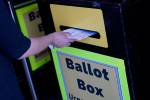U.S. Supreme Court rules in Nevada case
Conflicts of interest are as routine a part of Nevada government meetings as the Pledge of Allegiance. Full disclosure and abstention by Nevada politicians? Not so much.
But a Monday ruling by the U.S. Supreme Court, which overturned a Nevada Supreme Court decision that had gutted state ethics law, could change that.
The case is rooted in a vote by Sparks City Councilman Michael Carrigan in favor of a casino project that his friend and campaign manager, Carlos Vasquez, had lobbied for. Mr. Carrigan disclosed the relationship, then voted for the project. The Nevada Ethics Commission censured Mr. Carrigan because state law prohibited elected officials from voting on matters that benefit family, close friends or business associates. Mr. Carrigan challenged the finding.
In overturning the censure of Mr. Carrigan, the Nevada Supreme Court found the law unconstitutional, saying he had a free-speech right to vote on the casino plan despite the potential conflict of interest. The Ethics Commission appealed.
The U.S. Supreme Court shredded that ruling, saying elected officials' votes are not free expression protected by the First Amendment, but are instead acts subject to government regulation. The decision restores the Nevada law that prohibits elected officials from voting on issues that create a conflict of interest.
"Voting is not a symbolic action," said Justice Antonin Scalia, writing for the unanimous court, "as is, for example, the burning of a flag." When a public official votes, "he does so not as an individual but as a political representative engaged in the legislative process. Acting in that capacity, his vote is not his own speech but a mechanical function of government."
The vote "is not personal to the legislator but belongs to the people; the legislator has no personal right to it."
In a state where a handful of powerful political players advise not only elected officials, but the myriad business interests that routinely come before them, the ruling could easily force half of some local government bodies to sit out multiple votes on matters of community importance.
The question is, will the Ethics Commission start telling elected officials when they can and cannot vote? At the Legislature, where so many public employees serve and vote on the budgets of their employers, might lawmakers finally be forced to disclose and abstain from deciding tax, spending, policy and pension issues? And will businesses begin putting selected consultants on retainer to manufacture conflicts for elected representatives who oppose their projects, as was common last decade?
Who can oppose ethics in government and efforts to dry up the juice that powers our political landscape? But if ethics standards consistently leave voters without a voice in the governments they pay for, who really represents us?
Whether an elected official abstains from voting on major issues monthly or sets about rewarding friends and family, voters must be the ultimate arbiter of what's acceptable.























